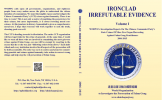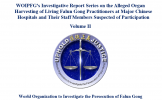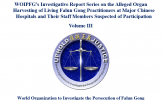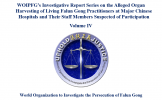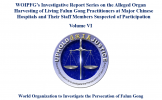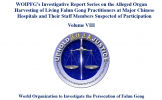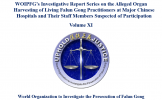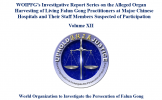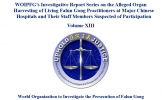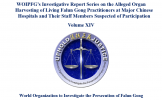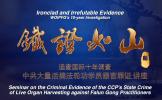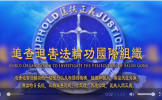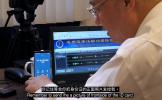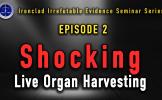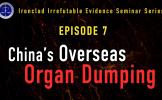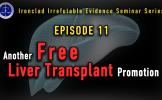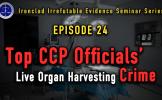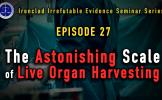“China will stop using organs from executed prisoners by Jan. 1, 2015” Another Deception to Hide its Practice of Live Organ Harvesting
Foreword
1. The first admission of large scale use of prisoners’ organs by China’s Vice Minister of Health “opened up a Pandora’s box” and was denied by the Chinese government twice.
2. Newly established Organ Transplant Committees missing from the Chinese government website and have no websites of their own.
3. Huang Jiefu’s director positions on the Transplant Committees missing from his official resume.
4. The CCP’s Regulations and Provisions on the use of prisoners’ organs have no legal binding.
5. Information about the number of executions and organs from prisoners is considered a state secret.
6. Admitting to the use of prisoners’ organs and manipulating the number of executions, the CCP attempts to cover a worse crime.
Conclusion
Foreword
On Dec. 3, 2014, at a Chinese Hospital Association Organ ProcurementOrganization (OPO) Alliance seminar held in Kunming city Yunnan province, China’s former Vice-Minister of Health, Huang Jiefu, announced that “starting Jan. 1, 2015 China will stop using the organs from executed prisoners[1].”This announcement attracted international attention.
Although there have been doubts about whether China’s so-called voluntary organ donation system, which was just started, is able to meet the demand of over 10,000 transplants every year, many in the international community still hope that this announcement will end the ethical nightmare caused by China’s illicit organ harvesting practice.
However, an analysis of publicly accessible materials in China concludes that the statement of “stop using organs from executed prisoners”is neither a State policy nor a legally binding legislation by the Chinese government.
The pivotal issue regarding the organ sources in mainland China has never been about executed prisoners. The statement is a deliberate fabrication to hide the unethical practice of live organ harvesting by the Chinese Communist Party (CCP). This report provides evidence to support the above argument.
1. The first admission of large scale use of prisoners’ organs by China’s Vice Minister of Health “opened up a Pandora’s box” and was denied by the Chinese government twice
In November 2005, at the World Health Organization’s (WHO) Western Pacific Regional Conference held in Manila, Huang Jiefu publicly acknowledged that the transplanted organs in China came mainly from executed prisoners.
The conference documentation reads, “In China, most of the approximately 2,000 liver transplants and 6,000 kidney transplants performed each year come from cadaveric organs derived from executed prisoners[2].”
In January 2015, Huang Jiefu said in an interview with Hong Kong based Phoenix TV that back in 2005, many people felt that he “had opened up a Pandora’s box”by publicly admitting the organ sources being executed prisoners. Huang added that he received “high-level support”only after he returned from the WHO conference[3].
It is reasonable to conclude that November 2005 was the first time that Huang mentioned about executed prisoners being the source of transplant organs. Otherwise, there would not be the argument of “having opened up a Pandora’s box.”The earliest report about the Manila conference was published in the November 2005 issue of Caijing Magazine[4]. Afterwards, almost all Chinese reports cited from this article.
Although Huang Jiefu was the Vice Minister of Health at the time of the Manila conference, there was no indication that his claim regarding the organ source had been authorized by the CCP. Moreover, in the first half of 2006, two CCP spokespersons denied Huang Jiefu’s claim.
March 2006: Huang’s statement denied by the Foreign Ministry Spokesperson
On March 28, 2006, at a regular press conference, the Foreign Ministry spokesperson Qin Gang denied allegations of the existence of a Sujiatun Concentration Camp (where harvesting organs from live Falun Gong practitioners was being carried out), while emphasizing that “the numbers of organs used from executed prisoners for transplantation is very few, and the individual’s consent has to be obtained[5].”
April 2006: Huang’s statement denied by the Health Ministry Spokesperson
On April 10, 2006, at a regular Health Ministry press conference, Health Ministry spokesperson Mao Qun'an said that organs used in the country's transplant surgeries mainly come from voluntary donations made by citizens before they pass away. He added: “For a fraction of inmates who have committed serious crimes and are awaiting the death penalty, body parts could be used only if they sign a medical document, or if their families approve," he said. "It also needs the approval of the relative administrative and judiciary departments after strict scrutiny has been conducted."[6].”
The above two cases of denial (that transplanted organs mainly came from executed prisoners) are more representative of the CCP’s official view back in early 2006.
2. Newly established Organ Transplant Committees missing from the Chinese government website and have no websites of their own
At least three transplant related committees were setup by the CCP since 2006.
- The Organ Transplant Committee (OTC) established in July 2006[7].
- The China Organ Donation Committee (CODC) established in 2008[8].
- The China Organ Donation and Transplant Committee established in March 2014 as the combination of OTC and CODC[9].
Huang Jiefu was the head of all three committees.
The March 2014 notice to combine OTC and CODC was jointly issued by the National Health and Family Planning Commission (NHFPC) and the Red Cross of China. The notice was posted on the NHFPC’s website[10]. The NHFPC website categorizes its affiliated institutions into four categories, namely "Commission Institutions,”“Directly Affiliated Units,”“Business Executive Organizations,”and “Local Health and Family Planning Departments.”The China Organ Donation and Transplant Committee does not belong to any of the four categories.
China implemented the “government online project” more than a decade ago. Even the lowest-level government administrative agencies, townships and sub-district offices have their own official websites. But none of these transplant related committees have their own websites.
3. Huang Jiefu’sdirector positions on the Transplant Committees missing from his official resume
Huang Jiefu has been acting as the “unofficial spokesperson”on China’s organ transplant situation since 2006. He frequently use titles such as (former) Vice-Minister of Health (October 2001 - March 12, 2012), Director of OTC (July 2006), Chairman ofCODC(2008) and Chairman of China Organ Donation and Transplant Committee (March 1, 2014).
On the website where CCP officials’resumes are published, Huang Jiefu’s only current position is the deputy director of the Central Health Committee. The Vice-Minister of Health is mentioned as his previous position. Also listed are other lower level medical-related positions, such as the director of liver surgical department at Beijing Union Medical College Hospital, as well as his positions at some Chinese and foreign medical universities. However, his director position on OTC, CODC and China Organ Donation and Transplant Committee, which are his frequently used titles when making announcements about China’s transplant policies, are not listed[11].
4. The CCP’s Regulations and Provisions on the use of prisoners’ organs have no legal binding
Regarding the use of executed prisoners’organs for transplant, the CCP issued an“Interim Provision on the Use of Cadavers and Organs from Executed Prisoners” in 1984. Although the “Interim Provision” was jointly issued by the Supreme People’s Court, the Supreme People’s Procuratorate, the Ministry of Public Security, the Ministry of Justice, the Ministry of Health and the Ministry of Civil Affairs, it is not legally binding[12].
On March 21, 2007, the “Regulations on Human Organ Transplantation”was promulgated by the State Council[13]. It is not a law, nor does it repeal the 1984 Interim Provision.
From a legal perspective, the CCP has not done anything to change its practice of using the organs from executed prisoners for transplants. Rather than listening to Huang Jiefu’s announcements, the international community should be looking for the repealing the 1984 Interim Provision as a sign of CCP’s intention to change.
5. Information about the number of executions and organs from prisoners is considered a state secret
On June 27, 2001, Dr. Wang Guoqi, a former doctor at Tianjin Armed Police Forces Hospital, testified before the U.S. Congress, exposing the hospital’s use of organs from executed prisoners[14]. A week later, on a State Council Information Office press conference, the deputy director at Tianjin Armed Police Forces Hospital, Tian Fuming called Dr. Wang’s testimony “a completely unfounded, fabricated, malicious anti-China farce, created for despicable purposes[15].”
There was no further investigation into CCP’s use of organs from death row prisoners, and the CCP was not pressured to explain the issue again. However, as the CCP has been under constant scrutiny regarding its annual number of executions, it has thus declared the number of executions a state secret. In addition to the numbers, organs from executed prisoners have also been treated as a state secret by the CCP.
Any accusations regarding these state secrets(i.e. major human rights violations) have been vehemently denied or blatantly ignored by the CCP, until a paradigm shift in its attitude towards these issues occurred around 2006.
6. Admitting to the use of prisoners’ organs and manipulating the number of executions, the CCP attempts to cover a worse crime
Since 2006, the CCP stopped denying the allegations of its using executed prisoners’ organs. Moreover, it has been manipulating the numbers of executions, turning them into international focal points. Huang Jiefu is in the center of it all. WOIPFG has carried out a special investigation regarding this issue. The result can be seen in the report titled “How the Chinese Regime Uses the Former Vice Minister of Health, Huang Jiefu, to Conceal its Unethical Organ Procurement Practices”[16].
Various international human rights groups annually release estimated number of executions in China. Amnesty International estimated about 1,600 executions annually[17]. However, these numbers are far too low to explain the surge in the organ transplant numbers in China since 1999 and the10,000 transplants performed annually.
On March 7, 2013, Huang Jiefu told Southern Metropolis Daily in an interview: “During the past 10 years, China’s number of executions has been declining at a rate of 10 percent per year[18].” Huang’s statement made the execution number around 2003 much larger than what was estimated by the international human rights groups.
Coincidentally, the Dui Hua Foundation also noted in a report published in October 2014 that the numbers of executions were 12,000 in 2002, 6,500 in 2007, 3,000 in 2012 and 2,400 in 2013. Dui Hua Foundation revealed that they had obtained the information from “a judicial official, who has privileged access to Chinese state secrets, such as the annual numbers of executions[19].” This report also puts the execution number of 2002 much larger than the estimated numbers.
By increasing the number of executions over the past 10 years, the CCP attempts to close the gap between the annual transplant numbers and the execution numbers, so as to hide the real source of the transplanted organs, which is from the large population of prisoners of conscience, the majority of whom are Falun Gong practitioners.
Conclusion
An insufficient supply of organ donors has been the bottleneck of organ transplantation around the world, including in developed countries, where a considerable number of citizens voluntarily participate in organ donation.
China is a country where people are traditionally against organ donation, and there is no organ donation and distribution system. However, within two years of launching a so-called voluntary organ donation system in China, the former Vice-Minister of Health, Huang Jiefu announced that China would no longer rely on the organs of executed prisoners. Rather than calling this a miracle, it would be more appropriate to call this wishful thinking or an outright lie.
The last public denial by a CCP official spokesman that executed prisoners’organs were being used took place in April 2006. The CCP’s turning point from denying to acknowledging and even hyping up the use of executed prisoners’organs occurred after April 2006, coinciding with a most significant event in March of that year. Two witnesses from China exposed the crimes of harvesting the organs of living Falun Gong practitioners by a hospital in Sujiatun district, Shenyang city, Liaoning province.
The hyping up China’s use of executed prisoners’organs was not intended as an admission to having committed a crime or broken international ethics standards, but rather an unofficial response to the allegations that the CCP was condoning large-scale live organ harvesting from Falun Gong practitioners.
The international community should not be confused by Huang Jiefu’s claims, and should not set its main focus on whether or not China uses executed prisoners’organs for transplantations. The focus should be to demand that Chinese authorities provide the true identities of the organ “donors”of the past 15 years. It is especially important not to be deceived by the so-called citizen organ donation system touted by Huang Jiefu. In 2013, Huang acknowledged that he had performed more than 500 liver transplants in 2012 alone[20]. The international community should demand that Huang provide the donor sources of these livers, rather than hastily accepting his talks, which were not officially recognized by the CCP.
References
[1]《南方都市报》2014年12月05日,“明年起中国全面停止死囚捐献器官,中国医院协会OPO联盟主席黄洁夫表示,公民自愿捐献将成为器官移植唯一渠道” 作者:程姝雯
“南都讯 记者程姝雯 南都记者3日从权威渠道获悉,中国人体器官捐献与移植委员会主任委员、中国医院协会人体器官获取组织联盟(中国医院协会O PO联盟)主席黄洁夫在当日召开的中国医院协会O PO联盟昆明研讨会上正式宣布:从2015年1月1日起,全面停止使用死囚器官作为移植供体来源,公民逝世后自愿器官捐献将成为器官移植使用的唯一渠道。”
“Southern Metropolis Daily” Dec. 5, 2014, “OPO chairman Huang Jiefu states that China will stop using organs from executed prisoners starting next year.”
http://epaper.nandu.com/epaper/M/html/2014-12/05/content_3355770.htm?div=-1
[2] Consultation Meeting on Transplantation with National Health Authorities in the Western Pacific Region
http://www.moh.gov.my/images/gallery/orga/Consultation-Meeting.pdf
[3]《凤凰卫视》2015年01月11日,“黄洁夫:我只看过一次摘取器官觉得需要改变”
“Pheonix TV” Jan. 11, 2015, “Huang Jiefu: I only witnessed once the organ extraction it needs change”
http://news.ifeng.com/a/20150111/42906812_0.shtml
[4]《财经》杂志总147期2005年11月28日 “器官移植:加快规制的地带”
“Caijing Magazine” Nov. 28, 2005 “Organ Transplant: speeding up regulations”
http://magazine.caijing.com.cn/2005-11-28/110062607.html
[5]《自由亚洲电台》2006年3月29日,“中国否认从死刑犯身上摘取器官”
“Radio Free Asia” March 29, 2006, “China denies harvesting organs from executed prisoners”
http://www.rfa.org/mandarin/yataibaodao/organ_harvest-20060329.html
[6]《新华网》2006年4月10日“卫生部驳斥中国随意取死刑犯器官移植的言论”
http://news.xinhuanet.com/newscenter/2006-04/10/content_4405862.htm
China Daily, 2006-04-11 “Prisoners' organs not harvested without consent” By Wang Ye (China Daily)
http://www.chinadaily.com.cn/china/2006-04/11/content_564719.htm
[7]《新华网》2008年3月14日“卫生部副部长黄洁夫:器官移植将设国家监管机构”来源:新京报
“Xinhua” March 14, 2008 “Vice Health Minister Huang Jiefu: Organ transplant needs state regulatory agency”
http://news.xinhuanet.com/misc/2008-03/14/content_7785194.htm
《中国网》2008年3月14日“卫生部副部长黄洁夫:器官移植将设国家监管机构” 来源:新京报
http://www.china.com.cn/policy/txt/2008-03/14/content_12543001.htm
[8]《中央政府门户网站》2013年3月1日 “《天津市人体器官捐献条例》3月1日起实施”来源:天津日报
www.gov.cn, March 1, 2013, “Tianjin Organ Donation Regulation effective on March 1”
[9]《科学网》2014年3月8日“黄洁夫委员:每百万人中只有0.5人自愿捐献器官”
“sciencenet.cn” March 8, 2014, “Huang Jiefu: Only 0.5 person out of every 1 million people voluntarily donate organs”
http://news.sciencenet.cn/htmlnews/2014/3/289619.shtm
[10]《国家卫生计生委医政医管局网站》2014年3月7日“国家卫生计生委中国红十字会总会关于成立中国人体器官捐献与移植委员会的通知”国卫医发〔2014〕9号
“NHFPC website” March 7, 2014, “Notice to establish China Organ Donation and Transplant Committee”
http://www.nhfpc.gov.cn/yzygj/s3585u/201403/7f8a8f02b890417281c75f6f83aeb215.shtml
[11]《中国共产党新闻网》中国领导干部资料库黄洁夫
“CCP News Network” Database of CCP officials: Huang Jiefu
http://cpc.people.com.cn/gbzl/html/121001565.html
[12] “最高人民法院、最高人民检察院、公安部、司法部、卫生部、民政部关于利用死刑罪犯尸体或尸体器官的暂行规定”状态:有效发布日期:1984-10-09 生效日期: 1984-10-09
Oct. 9, 1984 “Interim Provision on the Use of Cadavers and Organs from Executed Prisoners”
http://www.110.com/fagui/law_21137.html
[13]《中央政府门户网站》 2007年04月06日来源:国务院办公厅 “人体器官移植条例”
“CCP central government website” April 6, 2007, “State Council: Regulations on Human Organ Transplantation
http://www.gov.cn/zwgk/2007-04/06/content_574120.htm
[14] ORGANS FOR SALE: CHINA'S GROWING TRADE AND ULTIMATE VIOLATION OF PRISONERS' RIGHTS
http://commdocs.house.gov/committees/intlrel/hfa73452.000/hfa73452_0f.htm
[15]《新华网》2001年07月04日,“武警天津医院:死刑犯器官移植的指称完全是捏造”
“xinhua” July 4, 2001 “Tianjin Armed Forces Police Hospital: Statement of using executed prisoners’ organs for transplant is a complete lie”
http://news.sina.com.cn/c/293410.html
[16] “upholdjustice.org” April 30, 2014 “Investigative Report on How the Chinese Regime Uses the Former Vice Minister of Health, Huang Jiefu, to Conceal its Unethical Organ Procurement Practices”
http://www.upholdjustice.org/node/247
[17]《器官移植调查网》2006年7月6日
“Report into Allegations of Organ Harvesting of Falun Gong Practitioners in China”Author: David Matas and David Kilgour
http://organharvestinvestigation.net/report0607/report060706-eng.pdf
[18]《中国器官移植网》 2013年3月7日 “九成医生尚不了解脑死亡黄洁夫认为相关立法条件未成熟” 来源:南方都市报
“China Organ Transplant network website” March 7, 2013 “90 percent of doctors don’t understand brain death, Huang Jiefu considers legislation immature”
[19] Duihua.org 2014年11月“China Executed 2,400 People in 2013”
[20]《大洋网》2013年3月13日“卫生部原副部长黄洁夫:我要带头向捐献者鞠躬” 来源:广州日报记者:刘蕤红、王鹤、李颖、贺涵甫
“dayang.net” March 13, 2013, “Former Vice Minister of Health Huang Jiefu: I want to bow to the organ donors”


